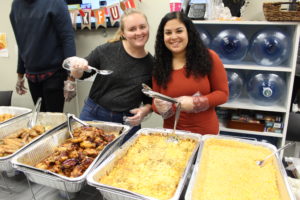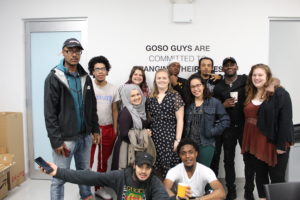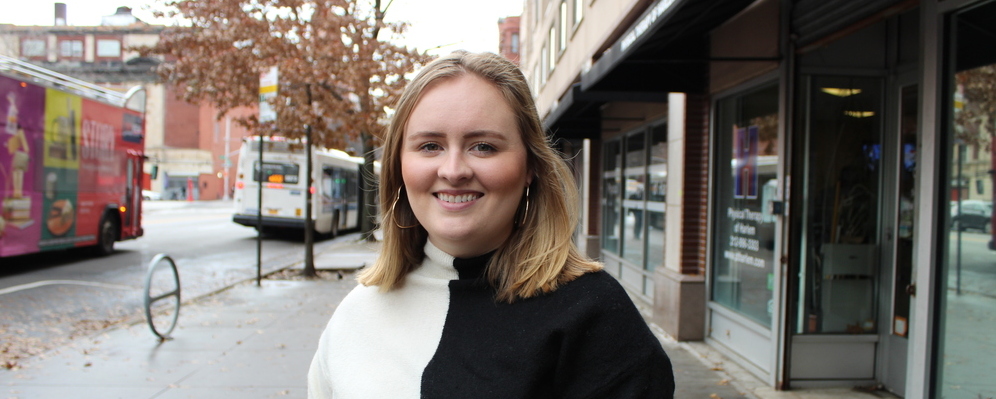GOSO is able to reach hundreds of justice-involved young men each year because we have a strong team of dedicated and passionate individuals who show up each day, ready to hit the ground running. All of our team members bring unique talents and perspectives to our organization, and our work wouldn’t be possible without each person’s contributions.
This week, we’re introducing you to Alyssa Sargent, LMSW who is our Coordinator of Measurements and Outcomes. Alyssa joined our team almost three years ago as a Social Work Intern while she was earning her MSW at Fordham University. We’re fortunate that she decided to join our team as a full-time staff member after she received her degree.
Read our interview with her below:
What is your role?
As Coordinator of Measurements and Outcomes at GOSO, I’m responsible for building and maintaining Salesforce, which is a huge customized database system that we use now. I help our program staff to ensure that we get all of our programmatic data into the system so we can track our numbers and check in on how we’re doing. My role exists so that we can make sure that what we’re doing as an organization actually works. If something isn’t working, let’s figure out why and then possibly redirect. It’s important for us to stay up to date on our progress and continue to grow.
Also, since I am an LMSW, I still get to work with our participants by providing therapy, running therapeutic groups, job readiness workshops, etc. I am still a social worker, so I can pivot from focusing on data to focusing on the people who are being directly impacted. I’m always available to be supportive to anyone who needs it.

Alyssa (left) with colleague Lauren, serving food at GOSO’s annual Thanksgiving lunch this year!
Why did you decide to work at GOSO?
I just truly believe in the mission at GOSO. As an intern, I got to know the rest of the staff really well and so when I graduated, I wanted to remain a part of the team I had become so close to.
What professional or personal experiences influence your work at GOSO?
I have always been really passionate about criminal justice reform. When I started to learn more about the prison industrial complex that exists in our country, I was also discovering the field of social work. During my graduate studies as a social work student, I decided to integrate these interests and think more deeply about criminal justice reform as it relates to social work.
Why should everyone care about the work that GOSO does?
I think our work is indicative of a larger problem that we have in the city and across the country. People are so concerned about where we are as a society, and our justice system is literally affecting millions of people in our country. We have the most incarcerated people in the world. GOSO is doing a great amount of work with a small amount of people, and I feel like it will have a trickle effect through our participants learning things at GOSO and spreading that knowledge to others. We’re not only impacting people who are directly affected by the system, but we’re also helping to change people who are enacting the laws and policies that are affecting our participants.
Communities are suffering, families and individuals are suffering. This is because our country has decided that the best way to “punish” someone is to remove them, and it’s been proven that this removal is not actually doing any good, it’s not making any difference in lessening crime.
Can you share a meaningful moment you had while working here?
There was a participant in crisis recently, and another staff member and I were working to help deescalate the situation. He was feeling very frustrated, and I was affirming to him that he had a right to be frustrated since the situation was challenging. He was frustrated because he was concerned that he was going to lose his job, and was having a hard time dealing with that. He felt that when he got his job, it was the first time that his mom had ever felt proud of him. It was huge to see him come to that realization on his own and it helped to reaffirm why I’m doing the work that I’m doing. I’m able to connect with people who are different than me but still help them reach these epiphanies or realizations about their lives. It was all him, and I was just sitting there affirming him, letting him know that this wasn’t the last time that his mom was going to be proud of him, and that it’s okay to be upset sometimes.

Alyssa (center) celebrating the end of her internship earlier this year with our other interns at the time and GOSO Guys!
What is your most important personal attribute that you bring to your job?
On a social work level, I always operate from kindness first. My approach is that I try to understand where someone is before making a quick decision on how we need to operate. Whether that’s a participant I’m doing therapy with or I’m just looking at the data. I think it’s so important that I’m a social worker in my role, because I can look at our numbers and understand the story behind those numbers. I can connect people to the numbers; I’m very person-focused.
What’s a piece of advice that you want to pass on to participants?
I would tell them to give people a chance to show them who they are before making an assumption about who they are or what they mean. See how you can collaborate with others instead of assuming that everyone wants something from you, or wanting something from others. Meet people where they are first, work to understand them, and you might actually understand yourself better too.
What’s something you do for fun while you’re not at GOSO?
I go to a TON of Broadway and Off-Broadway shows! I have a friend who works in that industry, so I get to go with her. I also love to read!
What is a GOSO workshop that you would create if you could?
I really want to start using Restorative Circle Practices here. We just did a training on how to use this practice to build community. I want to incorporate this into our LIT program, so that our LIT ambassadors can connect on a deeper level. I’d also love to help our participants become knowledgeable about how to facilitate these circles too so they can use the practice in their lives.
What’s something you’ve learned from being at GOSO?
Working on a team is incredible. I love having coworkers who are passionate about the work that they’re doing — they’re not coming just to do a job. Everyone is here to accomplish a common goal, and I’ve learned how powerful that is to see in action.

